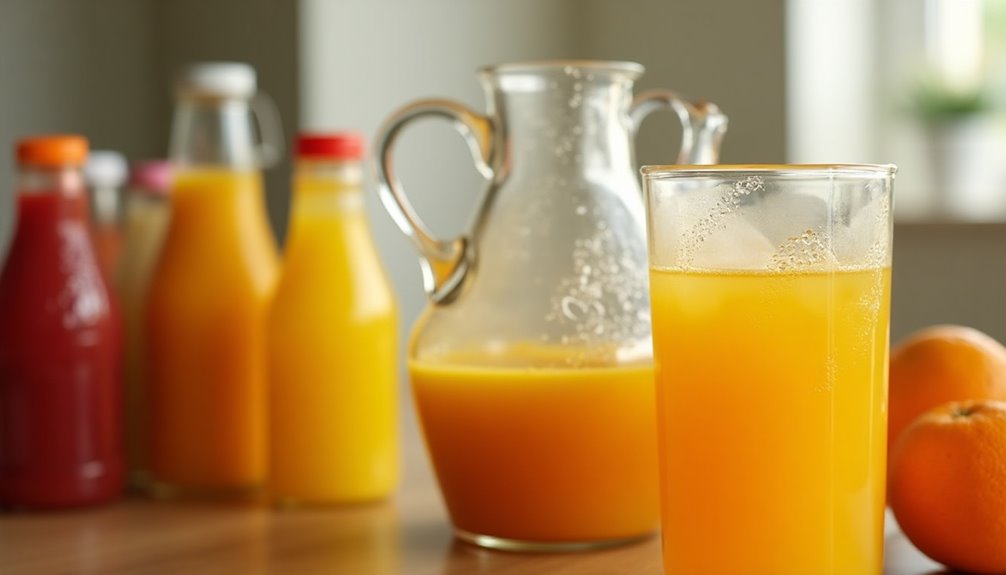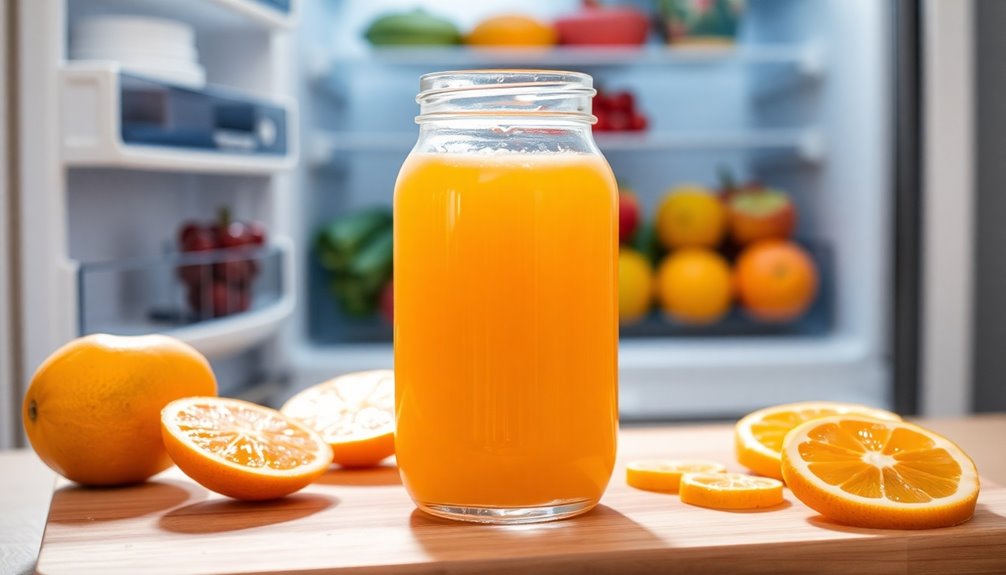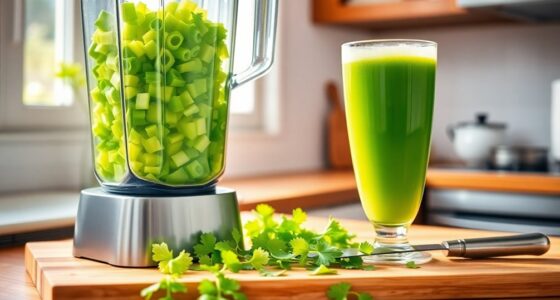Juice is usually good for about 7 to 10 days in the fridge after opening, but it can vary based on the type and how you store it. Store-bought apple juice lasts up to 10 days, while freshly squeezed juice is best consumed within 2 to 3 days. Homemade juice should ideally be drunk within the first 24 hours for maximum flavor. There's more to know about storage tips and spoilage signs that can help you enjoy your juice safely.
Key Takeaways
- Store-bought apple juice lasts up to 10 days in the fridge after opening.
- Freshly squeezed juice is best consumed within 2 to 3 days for optimal taste and nutrients.
- Homemade juice made with a blender can last between 24 to 72 hours, depending on storage.
- Canned apple juice remains good for about a week once opened if stored properly.
- Always check for signs of spoilage, like off smells and sour taste, before consuming juice.

When it comes to storing juice in the fridge, knowing how long it lasts can save you from unpleasant surprises. Whether you're sipping on store-bought apple juice or enjoying a fresh batch of homemade orange juice, understanding the shelf life is key to preventing spoilage. Different types of juice have varying durations of freshness, and knowing these can help you consume them at their best.
If you've recently opened a bottle of store-bought apple juice, it typically lasts up to 10 days in the fridge. However, freshly squeezed juice is a different story. For the best flavor and nutritional benefits, you should consume it within 2 to 3 days. The nutrients and taste begin to degrade quickly due to oxidation, so getting that fresh juice into your system sooner rather than later is ideal.
If you make homemade juice using a blender, expect it to last between 24 to 72 hours based on how you store it. You'll enjoy the most vibrant taste within the first 24 hours.
Canned juice also has its own rules. Once you open a can of apple juice, it remains good for about a week, but it's crucial to store it in an airtight container if it's not resealable. This helps minimize oxidation and keeps the juice tasting fresh.
Unopened store-bought fruit juice can last a lot longer, typically between 6 to 12 months, so you can stock up without worry. Just remember, once you open a shelf-stable juice, you should aim to consume it within 7 to 10 days to enjoy its full flavor and quality.
Always be on the lookout for signs of spoilage. Juice that's gone bad can show a cloudy appearance, emit off smells, or taste sour. If you notice any of these features, it's best to discard it rather than risk consuming spoiled juice. Spoilage can occur even before the expiration dates if the juice hasn't been stored properly.
Keeping your juice in an airtight container and making sure your fridge maintains the right temperature can help extend its freshness.
Frequently Asked Questions
Does Refrigerated Juice Go Bad?
Yes, refrigerated juice can go bad.
You should always check for signs of spoilage, like an off smell, cloudiness, fizz, or mold. If you notice any of these, it's best to toss it out.
To keep your juice fresh, store it in airtight containers and maintain temperatures below 40°F (4°C).
Can You Drink 4 Day Old Juice?
Drinking 4-day-old juice is like rolling the dice; it could be fine or it could be spoiled.
If you've stored it properly in an airtight container and kept it below 40°F, it's likely still good. Just trust your senses—if it smells off, looks cloudy, or has fizz, don't risk it.
How Long Is Juicy Juice Good for After Opening?
After you open Juicy Juice, it's good for about 7 to 10 days in the fridge.
To keep it fresh, make sure you store it tightly sealed in its original container. If it's in a carton, pop it in the fridge immediately after opening.
Always check for any changes in smell, color, or bubbles before drinking.
If you want it to last longer, consider transferring it to an airtight glass container.
How Do You Know if Juice Is Spoiled?
To know if juice is spoiled, check for cloudiness or fizz, which indicate potential spoilage.
If it smells boozy, that means fermentation has happened, making it unsafe.
Look for mold or a brown layer on top; these are clear signs of spoilage.
Lastly, if the taste resembles vinegar, it's time to toss it out.
Regularly inspecting your juice ensures you stay safe and enjoy fresh flavors.
Conclusion
In conclusion, keeping juice in the fridge can extend its freshness, but it's crucial to know when it's time to toss it. For instance, imagine you've got a half-finished bottle of orange juice lurking in the back of your fridge. After a week, its vibrant color fades and an off smell wafts up when you open it. Trust your senses—if it looks or smells funny, it's better to play it safe and say goodbye.
Cindy thoroughly researches juicing trends, techniques, and recipes to provide readers with practical advice and inspiration. Her writing style is accessible, engaging, and designed to make complex concepts easy to understand. Cindy’s dedication to promoting the advantages of juicing shines through her work, empowering readers to make positive changes in their lives through the simple act of juicing.











